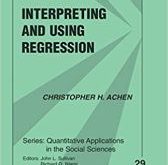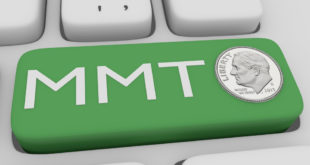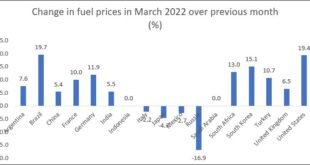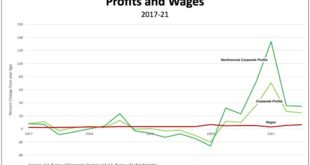from Lars Syll After having mastered all the technicalities of regression analysis and econometrics, students often feel as though they are masters of the universe. I usually cool them down with the required reading of Christopher Achen’s modern classic Interpreting and Using Regression. It usually gets them back on track again, and they understand that no increase in methodological sophistication … alter the fundamental nature of the subject. It remains a wondrous mixture of rigorous...
Read More »WEA Commentaries – volume 12, issue 1
download the whole issue What Caused Russia to Invade Ukraine?David Lane Economic Implications of MOOCs in Higher Education: An Indian perspective Binay Kumar Pathak An interview with Andrea Terzi on the current situation in the euro zone and Italy in particularMitja Stefancic Rethinking economics: an interview with Sam de Muijnck and Joris TielemanMitja Stefancic Please click here to support the World Economics Association
Read More »Weekend read – Making thoughts unthinkable – the soft power of economic theory
from WEA Pedagogy Blog The 1932 science fiction novel Brave New World portrays a dystopian future where history is rewritten and words are redefined in order to make undesirable ideas “unthinkable.”footnote 1 The book is often associated with George Orwell’s 1984, where those who do anything undesired by those in power are made into an “unperson,” with all evidence of their history destroyed. When anyone speaks the unthinkable, they are simply defined out of existence. More generally,...
Read More »Rega P3 with Exact cartridge, static
ISEE president videos: Dean Baker
The main insight of MMT
from Lars Syll MMT is, first and foremost, a balance sheet approach to macroeconomics. At its very core lie reserve accounting, then deposit accounting, and then sectoral balances accounting. There is very little behaviour in any of this. Equilibrium rules as all balances balance – in both flows and stocks – and there are no assumptions apart from the existence of a central bank, a Treasury, a banking system and some households and firms. MMT can only be learned by mastering its balance...
Read More »Panic about petrol prices
from C. P. Chandrasekhar and Jayati Ghosh The latest IPCC report makes it clear: the planet is now dangerously close to a tipping point and reliance on fossil fuels has to be drastically curtailed and even fully eliminated soon, to avoid catastrophic climate changes. Obviously, this urgent call fell on deaf ears where it matters. It didn’t take long, or even very much, for world leaders—especially those who should really know better and have the means to do otherwise—to renege on their...
Read More »Corruption in drug patents: take away the money
from Dean Baker The New York Times had an editorial about the corruption of the patent system in recent decades. It noted that the patent office is clearly not following the legal standards for issuing a patent, including that the item being patented is a genuine innovation and that it works. Among other things, it pointed out that Theranos had been issued dozens of patents for a technique that clearly did not work. As the editorial notes, the worst patent abuses occur with prescription...
Read More »Weekend read – Has economics — really — become an empirical science?
from Lars Syll In Economics Rules (Oxford University Press, 2015), Dani Rodrik maintains that ‘imaginative empirical methods’ — such as game theoretical applications, natural experiments, field experiments, lab experiments, RCTs — can help us to answer questions concerning the external validity of economic models. In Rodrik’s view, they are more or less tests of ‘an underlying economic model’ and enable economists to make the right selection from the ever-expanding ‘collection of...
Read More »Inflation and the case of the missing profits
from David Ruccio Everyone knows that inflation in the United States is increasing. Anyone who has read the news, or for that matter has gone shopping lately. Prices are rising at the fastest rate in decades. The Consumer Price Index rose 8.6 percent in March, which is the highest rate of increase since December 1981 (when it was 8.9 percent). Clearly, inflation is hurting lots of people—especially the elderly living on fixed incomes and workers whose wages aren’t keeping up the price...
Read More » Real-World Economics Review
Real-World Economics Review








